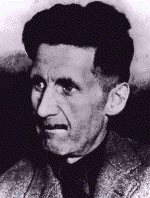
On each landing, opposite the lift shaft, the poster with the enormous face gazed from the wall. It was one of those pictures which are so contrived that the eyes follow you about when you move. BIG BROTHER IS WATCHING YOU, the caption beneath it ran.
"If you want a picture of the future, imagine a boot stamping on a human face--for ever."
--from Nineteen Eighty-Four
The British author George Orwell, pen name of Eric Arthur Blair, b. Motihari, India, June 25, 1903, d. London, Jan. 21, 1950, achieved prominence in the late 1940s as the author of two brilliant satires attacking totalitarianism. Familiarity with the novels, documentaries, essays, and criticism he wrote during the 1930s and later has since established him as one of the most important and influential voices of the century.
Orwell's parents were members of the Indian Civil Service, and, after an education at Eton College in England, Orwell joined (1922) the Indian Imperial Police in Burma, an experience that later found expression in the novel Burmese Days (1934). His first book, Down and Out in Paris and London (1933), was a nonfictional account--moving and comic at the same time--of several years of self-imposed poverty he had experienced after leaving Burma. He published three other novels in the 1930s: A Clergyman's Daughter (1935), Keep the Aspidistra Flying (1936), and Coming Up for Air (1939). His major works of the period were two documentaries: The Road to Wigan Pier (1937), a detailed, sympathetic, and yet objective study of the lives of nearly impoverished miners in the Lancashire town of Wigan; and Homage to Catalonia (1938), which recounts his experiences fighting for the Loyalists in the Spanish Civil War. Orwell was wounded, and, when the Communists attempted to eliminate their allies on the far left, fought against them and was forced to flee for his life.
Orwell's two best-known books reflect his lifelong distrust of autocratic government, whether of the left or right: Animal Farm (1945), a modern beast-fable attacking Stalinism, and Nineteen Eighty-Four (1949), a dystopian novel setting forth his fears of an intrusively bureaucratized state of the future. The pair of novels brought him his first fame and almost his only remuneration as a writer. His wartime work for the BBC (published in the collections George Orwell: The Lost Writings, and The War Commentaries) gave him a solid taste of bureaucratic hypocrisy and may have provided the inspiration for his invention of "newspeak," the truth-denying language of Big Brother's rule in Nineteen Eighty-Four.
Orwell's reputation rests not only on his political shrewdness and his sharp satires but also on his marvelously clear style and on his superb essays, which rank with the best ever written. "Politics and the English Language" (1950), which links authoritarianism with linguistic decay, has been widely influential. The four-volume Collected Essays, Journalism, and Letters of George Orwell was published in 1968.
Richard A. Johnson
Bibliography: Atkins, John, George Orwell (1955); Buitenhuis, P., and Nadel, I. B., George Orwell: A Reassessment (1988); Crick, B., George Orwell: A Life (1980); Kalechofsky, Roberta, George Orwell (1973); Kubal, David L., Outside the Whale: George Orwell's Art and Politics (1972); Lee, Robert A., Orwell's Fiction (1969); Meyers, Jeffrey, A Reader's Guide to George Orwell (1977) and, as ed., George Orwell (1975); Oxley, B. T., George Orwell (1969); Patai, D., The Orwell Mystique: A Study in Male Ideology (1984); Reilly, P., George Orwell: The Age's Adversary (1986); Stansky, P., and Abrahams, W., The Unknown Orwell (1972) and The Transformation (1979); Steinhoff, William, George Orwell and the Origins of 1984 (1975); Williams, Raymond, ed., George Orwell: A Collection of Critical Essays (1974); Woodcock, George, The Crystal Spirit (1966); Zwerdling, Alex, Orwell and the Left (1974).
Text Copyright © 1993 Grolier Incorporated
My favourite works by Orwell are Coming up for Air (fiction) and The Road to Wigan Pier (non-fiction). Here's a quote from The Road to Wigan Pier:
Large sections of the middle class are being gradually proletarianized; but the important point is that they do not, at any rate not in the first generation, adopt a proletarian outlook. Here I am, for instance, with a burgeois upbringing and a working-class income. Which class do I belong to? Economically I belong to the working class, but it is almost impossible for me to think of myself as anything but a member of the burgeoisie. And supposing I had to take sides, whom should I side with, the upper class which is trying to squeeze me out of existence, or the working class whose manners are not my manners? It is probable that I, personally, in any important issue, would side with the working class. But what about the tens or hundreds of thousands of others who are in approximately the same position? And what about that far larger class, running into millions this time - the office-workers and black-coated employees of all kinds - whose traditions are less definite middle class but who would certainly not thank you if you called them proletarians? All of these people have the same interests and the same enemies as the working class. All are being robbed and bullied by the same system. Yet how many of them realize it? When the pinch came nearly all of them would side with their oppressors and against those who ought to be their allies. It is quite easy to imagine a working class crushed down to the worst depths of poverty and still remaining bitterly anti-working-class in sentiment; this being, of course, a ready-made Fascist party.
Send all comments, suggestions, and information to fores@uv.es